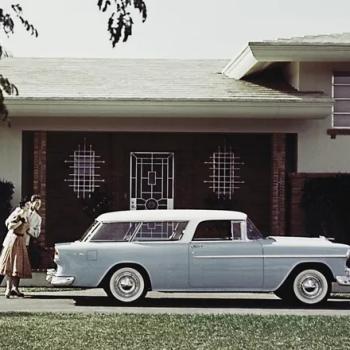Editor's Note: The article below is published as a part of a symposium hosted by Patheos' Catholic Portal and Evangelical Portal, entitled, "For Life and Family: Faith and the Future of Social Conservatism."
A few weeks ago, the Mormon faithful gathered in the tens of thousands for the Church of Jesus Christ of Latter-day Saints' 181st Semi-Annual General Conference. For two days church leaders preached on sin, redemption, and the need for virtuous and charitable lives. In recent years, however, Latter-day Saints and their fellow citizens have increasingly heard Mormon leaders opine on a more controversial topic: public policy. Mormons and non-Mormons alike may find helpful an overview of the relationship between the Mormon church and specific policies and politicians.
Most spectacularly, in 2008 the church threw its support behind California's Proposition 8, which reversed a California Supreme Court decision legalizing same-sex marriage. There have, however, been other forays into public policy debates. In November 2009 the church endorsed a Salt Lake City ordinance banning employment discrimination against homosexuals. Most recently, the church sent its Presiding Bishop H. David Burton to endorse moderate immigration reforms adopted by the Utah State Legislature.
Elder Dallin H. Oaks, a former Utah Supreme Court Justice and current member of one of the church's highest governing councils, spoke recently at Chapman Law School, where he insisted that religious leaders have a right to speak out on matters of public policy, pointing to abolitionism and the civil rights movements as examples of the positive influence that that religion can have on politics.
Not surprisingly, however, most reactions to Mormon interventions have turned on personal ideology. Liberals were horrified by the church's actions in California, but applauded its support for antidiscrimination legislation and immigration reform. Conservatives have cheered the church's efforts to defend traditional marriage but find themselves uncomfortable with its condemnation of their harsh approach to illegal immigration.
All of the criticisms of the church's political actions, however, are tinged with fear. Mormons accept high church leaders as "prophets, seers, and revelators," which seemingly grants them boundless authority over the faithful. Apparently unaccountable and unconstrained in their ability to mobilize their followers, the Mormon leadership looks like a potentially subversive force within the body politic. The reality, however, is that Mormon leaders are far more constrained than most observers assume.
First, they are sharply constrained by public opinion. Mormonism is both a missionary religion and a minority religion. This means that the leadership cares intensely about how the church is perceived by non-Mormons. There are serious costs when church members, who outside of a few enclaves in the West are a tiny minority, become a lightning rod for political passions. Likewise, a faith hungry for converts does not profit by tying its religious message to controversial political positions.
Second, the Mormon leadership is constrained by its own membership. Given how rare and muted criticism of the hierarchy is within the church, it is easy to forget this fact. In their book American Grace, political scientists Robert Putnam and David Campbell document that Mormons, relative to other religious denominations, actually hear very little about politics over the pulpit. This is not accidental.
In the past, Mormon leaders spoke with great frequency on political matters. Church President Heber J. Grant, for example, publically urged church members to oppose both the New Deal and the repeal of prohibition. Nevertheless, Utah's Mormon voters voted overwhelmingly in favor of both. The recent success of the church leadership in mobilizing the Mormon faithful is in large part a function of the fact that they do so relatively rarely. History suggests that the more frequently leaders opine on political matters, the less likely rank-and-file Mormons are to heed them.
Like all religions, Mormonism has teachings on what a just and healthy society looks like. These teachings can have implications for public policy, and Mormon leaders understandably feel compelled at times to push for particular political outcomes. Likewise, at times public policy has implications for the church's interests as an institution and a community. Mormon leaders should not be criticized for jumping into politics in these situations.
Non-Mormons who consider voting for a Mormon candidate, but who worry that a Mormon candidate might be unduly influenced by the LDS Church authorities, may be comforted to see the political tightrope the Mormon prophets are forced to walk. Constrained by both external and internal pressures, they need to pick their spots in exerting political influence, or they risk harming their church and frittering away their authority with the faithful.
How can church leaders stay true to their vision for society, while maintaining the church's growth and avoiding the alienation of Mormons and non-Mormons alike? It won't be easy, and it's not clear that the Mormon hierarchy is willing to risk more blow-ups like the one resulting from Proposition 8. In today's hyper-partisan political environment, the LDS church must consider carefully where and how to expend its political capital.
5/26/2011 4:00:00 AM




